
A record 164,000 people cast ballots in New York on the first two days of early voting in the city’s mayoral race. If elected, Zohran Mamdani would be the city’s first Muslim mayor. In recent days, he has faced a string of Islamophobic attacks. “I see a dynamic that I think lots of Muslims have experienced in the United States, which is when they’re given positions of power or are in a position of public scrutiny, that their faith is often the first thing that gets scrutinized,” says Meher Ahmad, staff editor for The New York Times opinion section.
Transcript
AMY GOODMAN: This is Democracy Now!, democracynow.org, The War and Peace Report. I’m Amy Goodman.
We end today’s show here in New York, where early voting began this weekend in the city’s mayoral race, with a record 164,000 ballots cast in the first two days. Democratic socialist mayor candidate Zohran Mamdani spoke Sunday evening before 13,000 supporters who packed the Forest Hills Stadium.
ZOHRAN MAMDANI: Together, New York, we’re going to freeze the —
SUPPORTERS: Rent!
ZOHRAN MAMDANI: Together, New York, we’re going to make buses fast and —
SUPPORTERS: Free!
ZOHRAN MAMDANI: Together, New York, we’re going to deliver universal —
SUPPORTERS: Healthcare!
ZOHRAN MAMDANI: We will make our city one where every person who calls it home can live a dignified life.
AMY GOODMAN: Mamdani spoke alongside independent Senator Bernie Sanders, New York Congressmember Alexandria Ocasio-Cortez and New York Governor Kathy Hochul, who endorsed Mamdani over former Governor Andrew Cuomo, who she replaced when Cuomo resigned in disgrace in 2021 after an inquiry found he sexually harassed at least 11 women.
If elected, Zohran Mamdani would be the city’s first Muslim mayor. In recent days, he’s faced a string of Islamophobic attacks, including from Cuomo, who made this widely condemned remark Thursday on the Sid & Friends in the Morning radio show.
ANDREW CUOMO: Any given morning, there’s a crisis, and people’s lives are at stake. God forbid, another 9/11. Can you imagine Mamdami [sic] in the seat? And as a [inaudible] —
SID ROSENBERG: Yeah, I could. He’d — he’d be cheering.
ANDREW CUOMO: Yeah, well, that’s another problem. But can you imagine that?
SID ROSENBERG: No. No.
AMY GOODMAN: On Friday, Zohran Mamdani responded to the surge of Islamophobia in the mayoral campaign, speaking out the Islamic Cultural Center in the Bronx.
ZOHRAN MAMDANI: To be Muslim in New York is to expect indignity. But indignity does not make us distinct. There are many New Yorkers who face it. It is the tolerance of that indignity that does.
AMY GOODMAN: Leading Democratic mayoral candidate Zohran Mamdani speaking Friday.
For more, we’re joined by Meher Ahmad, a staff editor for The New York Times opinion section. She interviewed Mamdani for her New York Times opinion essay, headlined “When I Look at Zohran Mamdani, Here’s What I See.”
Welcome to Democracy Now! What do you see?
MEHER AHMAD: I see a dynamic that I think lots of Muslims have experienced in the United States, which is when they’re given positions of power or are in a position of public scrutiny, that their faith is often the first thing that gets scrutinized. And that’s part of the reason I was interested in writing this piece. I think I saw the degree of Islamophobia that Mamdani was already facing after the Democratic primary nomination in June, and was shocked not just at the cadence of attacks, but also the kind of rhetoric that was being used against him by people within his own party.
AMY GOODMAN: So, talk about what he’s faced, right up through, well, President Trump and, most recently, Vice President JD Vance.
MEHER AHMAD: That’s right. In the last week or so, we’re seeing kind of outright Islamophobic attacks against him, where politicians have said things like another 9/11 could happen if he were to become mayor. They have outright called him a jihadist or terrorist. But in the weeks prior to that, what we’ve seen is kind of a normalization of Islamophobic attacks against him, accusations of him being antisemitic, accusations of him harboring hatred toward Jews. And these kinds of accusations are ones that I think many Muslims are very familiar with. So, we’ve kind of witnessed these attacks as a way to sideline us when we enter positions of power. And with Mamdani being one of the most high-profile politicians right now with the Muslim faith, that’s kind of become the main line of attack against him.
AMY GOODMAN: Mamdani was talking about what happened after 9/11 with Muslims, especially in New York. And Republicans, like Vice President JD Vance, attacked his comments. Vance wrote, quote, “According to Zohran, the real victim of 9/11 was his auntie who got some (allegedly) bad looks.” Talk more about what happened, I mean, this generation that has grown up in the wake of 9/11, of Muslim New Yorkers and Americans.
MEHER AHMAD: Yeah, and in New York in particular, where there was a large NYPD surveillance program, that was deemed unconstitutional after the fact, Muslims were surveilled in their places of prayer, in their homes, at sporting events, really in everyday aspects of their lives. And what that ends up doing to a community is it puts them on the back foot. It makes it feel as though we need to prove ourselves as not guilty to be able to participate in the city and to participate in any aspect of life. So, to become politically engaged felt that much more frightening. And I think Mamdani speaks to this. There’s this feeling of the way that you act amongst yourselves and your community privately, where you feel more free to be yourself, versus how you act when you go out into the street.
And after 9/11, you know, there was an uptick of Islamophobic attacks against Muslims all over the country, but particularly in New York City. And people who were visibly Muslim, particularly women who wear hijabs, often became the target of those kinds of attacks. I think Mamdani’s comments had to do with the fact that his aunt, you know, he said, felt too uncomfortable to go into public because she was wearing a hijab. JD Vance’s comments then mock that and say, “Oh, she’s supposedly the real victim of 9/11 because she felt this way.” I think there’s many, many victims of that event. And to discount the experience of Muslim Americans as being one that needs to be compared to, you know, other victims of that attack really makes it so that we have no right to be — to even express that we’ve been facing racism and bigotry.
AMY GOODMAN: Zohran Mamdani, when he’s state assemblymember, got arrested outside Senator Schumer’s house — maybe that’s not why he has not endorsed him — around the issue of Gaza.
MEHER AHMAD: That’s right.
AMY GOODMAN: Mamdani has been very outspoken on Palestinian rights. I interviewed him at the Jewish Voice for Peace mass protest, about a thousand, mainly Jews, shutting down Grand Central around Gaza. You write, “The candidate has become an avatar for many things, but when it comes to Islamophobia after Oct. 7, Mr. Mamdani is the poster child for the double standards that Muslims in America are held to today.” Explain.
MEHER AHMAD: You know, I think advocating for Palestine is a complicated and difficult thing to do in the United States for a variety of reasons, but advocating for Palestinian rights while being Muslim is a particularly unique experience. And I think part of that is because anti-Palestinian sentiment kind of rides on the back of Islamophobic ideas of who Muslims are. So, when Muslims, such as Mamdani, advocate for Palestinian human rights, it becomes not just that they’re, you know, advocating for Palestinians, but they’re advocating for violence or attacks against Jews. And that’s exactly what we’ve seen, you know, the accusations being hurtled against him. We saw a group of rabbis say that Jews would be in danger if he was to become the mayor.
You know, some of the people that I spoke to for the story, I kind of asked to elaborate: When you say you live in fear of him, what do you actually mean? And the explanation that I heard was that his criticism of Israel, which has now been accepted by, you know, multiple human rights organizations, is equivalent to advocating for violence against Jews. What I argue is that kind of assumption of Muslims is inherently racist, to assume that we have hatred towards Jews, and to kind of use that as a bludgeon to make it so that our views on Palestine can’t be expressed publicly.
AMY GOODMAN: And, of course, so many thousands of his organizers or canvassers on the ground are Jewish New Yorkers.
MEHER AHMAD: Exactly.
AMY GOODMAN: I want to end by thanking you. Meher Ahmad is a staff editor for The New York Times opinion section. Her latest essay for The New York Times is headlined “When I Look at Zohran Mamdani, Here’s What I See.” In the print version, the headline was “What Does It Mean to Be a 'Good' Muslim in America?”
That does it for our show. Democracy Now! is produced with Mike Burke, Renée Feltz, Deena Guzder, Messiah Rhodes, Nermeen Shaikh, María Taracena, Nicole Salazar, Sara Nasser, Charina Nadura, Sam Alcoff, Tey-Marie Astudillo, John Hamilton, Robby Karran, Hany Massoud. I’m Amy Goodman. Thanks for joining us.

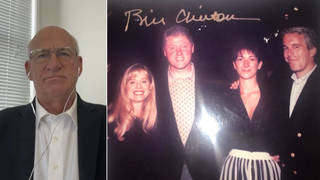
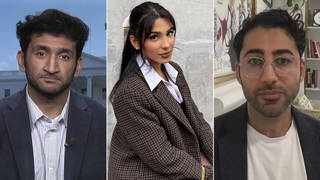
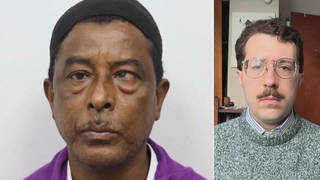
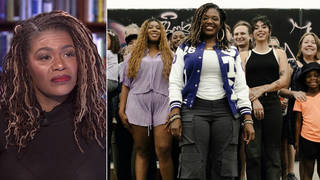






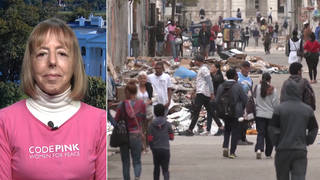
Media Options